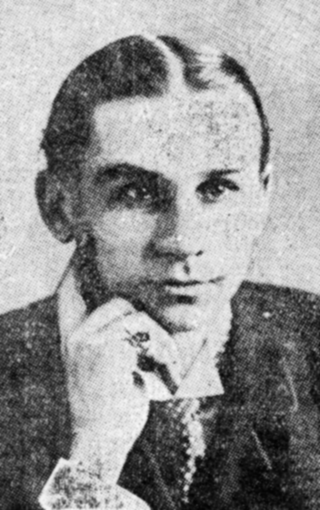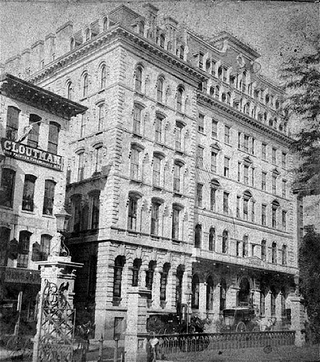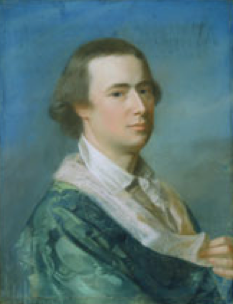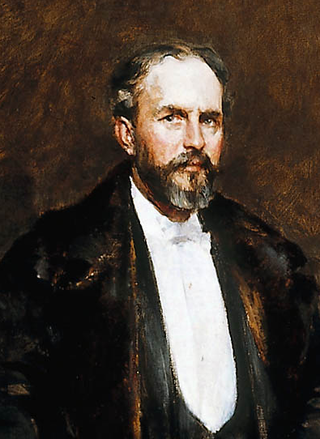
The Boston Brahmins, or Boston elite, are members of Boston's historic upper class. From the late 19th century through the mid-20th century, they were often associated with a cultivated New England accent, Harvard University, Anglicanism, and traditional British-American customs and clothing. Descendants of the earliest English colonists are typically considered to be the most representative of the Boston Brahmins. They are considered White Anglo-Saxon Protestants (WASPs).
Albert Smith Bigelow was a pacifist and former United States Navy Commander, who came to prominence in the 1950s as the skipper of the Golden Rule, the first vessel to attempt disruption of a nuclear test in protest against nuclear weapons.

Copley Square is a public square in Boston's Back Bay neighborhood, bounded by Boylston Street, Clarendon Street, St. James Avenue, and Dartmouth Street. The square is named for painter John Singleton Copley. Prior to 1883 it was known as Art Square due to its many cultural institutions, some of which remain today.

The Boston Athenaeum is one of the oldest independent libraries in the United States. It is also one of a number of membership libraries, for which patrons pay a yearly subscription fee to use Athenaeum services. The institution was founded in 1807 by the Anthology Club of Boston, Massachusetts. It is located at 10½ Beacon Street on Beacon Hill.
Henry Forbes Bigelow was an American architect, best known for his work with the firm of Bigelow & Wadsworth in Boston, Massachusetts. He was noted as an architect of civic, commercial and domestic buildings. In an obituary, his contemporary William T. Aldrich wrote that "Mr. Bigelow probably contributed more to the creation of charming and distinguished house interiors than any one person of his time." Numerous buildings designed by Bigelow and his associates have been listed on the United States National Register of Historic Places (NRHP).

Richard Clipston Sturgis, generally known as R. Clipston Sturgis, was an American architect based in Boston, Massachusetts.

Abbott Lawrence Rotch was an American meteorologist and founder of the Blue Hill Meteorological Observatory, the longest continually operating observation site in the United States and an important site for world climatology.
The Boston Board of Selectmen was the governing board for the town of Boston from the 17th century until 1822. Selectmen were elected to six-month terms early in the history of the board, but later were elected to one-year terms.
Harry Sullivan McDevitt was an American college football and baseball coach. He served as the head football coach at the Catholic University of America in 1912 and Colgate University in 1917. He coached baseball at Colby College. McDevitt played as a quarterback at Dartmouth College in 1906, where he also later served as an assistant football coach.

Tymoteusz "Timothee" Adamowski was a Polish-born American conductor, composer, and violinist. Born in Warsaw, he studied in that city's conservatory, later moving on to further studies in Paris. He served as the first conductor of the Boston Pops Orchestra. Adamowski was the uncle of Polish Olympic hockey player Tadeusz Adamowski and the humanitarian Helenka Adamowska Pantaleoni.

Harvey D. Parker (1805–1884), also known as H.D. Parker, was an hotelier in Boston, Massachusetts. He built the Parker House, the first hotel in the United States "on the European Plan".

The Saturday Club, established in 1855, was an informal monthly gathering in Boston, Massachusetts, of writers, scientists, philosophers, historians, and other notable thinkers of the mid-19th century.
The Boston Marine Society is a charitable organization in Boston, Massachusetts, formed "to 'make navigation more safe' and to relieve members and their families in poverty or other 'adverse accidents in life.'" Membership generally consists of current and former ship captains. The society provides financial support to members and their families in times of need; and also actively advises on maritime navigational safety such as the placement of lighthouses and buoys, and selection of Boston Harbor pilots.

Joseph Barrell (1739–1804) was a merchant in Boston, Massachusetts, in the 18th century. During the American Revolution, he owned ships commissioned as privateers, such as the Vengeance, ca.1779. In 1792, Barrell was "elected to the board" of Massachusetts branch of the newly established Bank of the United States, along with "George Cabot, Jonathan Mason Jr., ... and Fisher Ames."

Ernest Wadsworth Longfellow (1845–1921) was an American artist in Boston, Massachusetts, and New York. He was the son of Henry Wadsworth Longfellow.

The New-England Magazine was an American monthly literary magazine published in Boston, Massachusetts, from 1831 to 1835.

Grundmann Studios (1893–1917) in Boston, Massachusetts, was a building on Clarendon Street in the Back Bay. It contained artist's workspaces and multipurpose function rooms Copley Hall and Allston Hall. Prior to 1893, it functioned as a skating rink; after the Boston Art Students' Association leased the building it was renamed in honor of local art educator Emil Otto Grundmann. The Massachusetts Institute of Technology, whose campus was adjacent, owned the property. Tenants included the Copley Society ; artists Henry R. Blaney, Herman Dudley Murphy, Frank Richmond, Mary Bradish Titcomb; sculptor John A. Wilson, architect Josephine Wright Chapman; and the College Club.

Bradlee, Winslow & Wetherell (1872–1888) was an architecture firm in Boston, Massachusetts. Its principals were Nathaniel Jeremiah Bradlee (1829–1888), Walter Thacher Winslow (1843–1909) and George Homans Wetherell (1854–1930). Most of the firm's work was local to Boston and New England, with a few commissions as far afield as Seattle and Kansas City.
The St. Botolph Club is a private social club in Boston, Massachusetts, founded in 1880 by a group including many artists. Its name is derived from the English saint Botolph of Thorney.

Theodore Frelinghuysen Dwight was an American librarian, archivist, and diplomat who was a member of Boston's elite homosexual subculture in the late 19th century. His place in American literary history was secured when he served for almost a decade as Henry Adams's literary assistant and family archivist.















